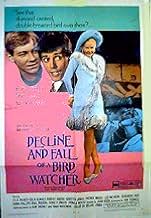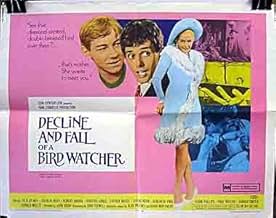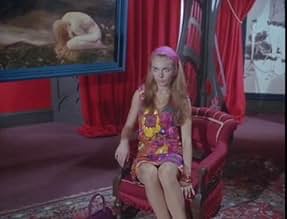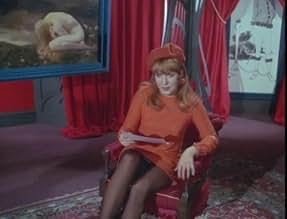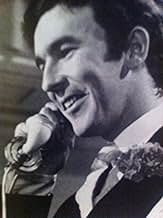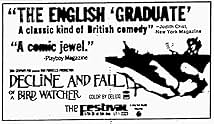Pendiente y caída... de un cándido mirón
Título original: Decline and Fall... of a Birdwatcher
PUNTUACIÓN EN IMDb
5,6/10
128
TU PUNTUACIÓN
Añade un argumento en tu idiomaA naive young man, sent down from university, blunders through a series of bizarre adventures in which his participation is always innocent, although others don't think so.A naive young man, sent down from university, blunders through a series of bizarre adventures in which his participation is always innocent, although others don't think so.A naive young man, sent down from university, blunders through a series of bizarre adventures in which his participation is always innocent, although others don't think so.
- Dirección
- Guión
- Reparto principal
Geneviève Page
- Margot Beste-Chetwynde
- (as Genevieve Page)
Reseñas destacadas
I'd missed this when it was given a U.S. theatrical release and, considering its cast, thought I'd give it a whirl when it was shown today on the FOX Movie Channel. But, as it unreeled, the recollection of its lukewarm-to-poor reviews came vividly to mind. It's a thorough disappointment in lots of ways, beginning with a script that has barely a hint of what was, no doubt, a good example of novelist Evelyn Waugh's acerbic social satire. The production design, typical of most films then, British and American, is colorfully garish. And the waste of the acting talent of a phalanx of the best British character actors is awesomely prodigious, attributable, I'm sure, to the slack direction of one John Krish, whose meager filmography is testament to his utter mediocrity. I should have been forewarned by the psychedelic colors swirling under the main credits (Well, the year of production WAS 1968, after all.) and the soupy music of Ron Goodwin, whose syrupy strains inappropriately underline most of the film's unfolding. Worst of all was the misuse of the elegant Genevieve Page, an actress perfectly capable of playing a lady of privilege and breeding, who seems, in this one, to be an inexperienced amateur attempting a role for which she is almost entirely unsuited. What a pity!
I love Evelyn Waugh's writing and have read a lot of biographies and critical works plus seen various films and TV adaptations. I only found out about this film recently and bought the DVD on Amazon.
On the basis of the various reviews, I approached seeing it more in the sense of duty to tick it off rather than from any expectations. However, I found it both enjoyable and reasonably faithful to the book. Yes, it is a bit labored in places and unnecessarily updated to the 1960s. But I think it catches the essence of Waugh, particularly the way that certain characters keep on reappearing in new guises..
The main characters were captured just right by a great cast of British actors.I would pick out Colin Blakely as Solomon Philbrick, Leo McKern as Captain Grimes, Robert Harris as Prendergast, and Donald Wolfit as Fagan. Genevieve Page is an enchanting and manipulative Margot Beste-Chetwynde. And Robin Phillips played Paul Pennyfeather as he should be, a lightweight and naive person who allows himself to be buffeted by Fortune.
It will be interesting to see the BBC version due to be released in 2017. However, this 1968 version has been undeservedly forgotten and is well worth watching.
On the basis of the various reviews, I approached seeing it more in the sense of duty to tick it off rather than from any expectations. However, I found it both enjoyable and reasonably faithful to the book. Yes, it is a bit labored in places and unnecessarily updated to the 1960s. But I think it catches the essence of Waugh, particularly the way that certain characters keep on reappearing in new guises..
The main characters were captured just right by a great cast of British actors.I would pick out Colin Blakely as Solomon Philbrick, Leo McKern as Captain Grimes, Robert Harris as Prendergast, and Donald Wolfit as Fagan. Genevieve Page is an enchanting and manipulative Margot Beste-Chetwynde. And Robin Phillips played Paul Pennyfeather as he should be, a lightweight and naive person who allows himself to be buffeted by Fortune.
It will be interesting to see the BBC version due to be released in 2017. However, this 1968 version has been undeservedly forgotten and is well worth watching.
When choosing to adapt this film, why would you throw away many of the gifts (easy wins, five-yard tap-ins, call them what you will) that Waugh's novel offers the film-maker? The dialogue sparkles on the page, and the set pieces come thick and fast, but the film misses much of the good stuff out, particularly early on in the action, or simply botches it. Waugh's characters also offer plenty of scope for effective adaptation to the screen, but the film makes a rather mushy attempt at most of the character portrayals too, despite the efforts of a strong cast.
Waugh's biting humour is dulled and debased from the start, reaching almost "Carry on"-like levels of simplicity. Paul is spuriously turned into a birdwatcher for about four seconds at the start of the action for the purpose of making smutty hints at a sex comedy that the film doesn't deliver (see also the publicity posters). The potential for sexual transgression that shimmers under the surface of Waugh's writing is also botched; the film spells it out rather demurely (this was the 1960s, when censorship was still very strict), while aiming desperately for superficial titillation.
There are so many simply baffling choices in terms of character and action that it's hard to know where to start. That's not to say a film can't be successful if it doesn't stick close to the source - of course it can, but it has to add something new or interesting or unusual, or stand on its own two feet as a piece of art. This extraordinary effort does none of these things.
The film is almost rescued by some of the settings (but not the ludicrous prison, with its gurning, overacting warders), by the luminous Genevieve Page, and by the occasional neat touch. But surely it's time for somebody like Stephen Fry to show (again) how a Waugh adaptation should be done? A film to watch for Waugh completists only,I'm afraid. Just shield your eyes from the worst of the butchery.
Waugh's biting humour is dulled and debased from the start, reaching almost "Carry on"-like levels of simplicity. Paul is spuriously turned into a birdwatcher for about four seconds at the start of the action for the purpose of making smutty hints at a sex comedy that the film doesn't deliver (see also the publicity posters). The potential for sexual transgression that shimmers under the surface of Waugh's writing is also botched; the film spells it out rather demurely (this was the 1960s, when censorship was still very strict), while aiming desperately for superficial titillation.
There are so many simply baffling choices in terms of character and action that it's hard to know where to start. That's not to say a film can't be successful if it doesn't stick close to the source - of course it can, but it has to add something new or interesting or unusual, or stand on its own two feet as a piece of art. This extraordinary effort does none of these things.
The film is almost rescued by some of the settings (but not the ludicrous prison, with its gurning, overacting warders), by the luminous Genevieve Page, and by the occasional neat touch. But surely it's time for somebody like Stephen Fry to show (again) how a Waugh adaptation should be done? A film to watch for Waugh completists only,I'm afraid. Just shield your eyes from the worst of the butchery.
10stern409
It was the sixties-you have to embrace that-perfect example of the creative kinkiness that pervaded that era. The set production is beyond and captures what was cool back then- that house is so cool- the green Rolls coming into the house was a hoot-the actors are spot on -it is a pure joy to watch them frolic through this movie.
I'm sad the other reviewers don't get it- it is an important piece of history that gives an insight into the times- much the same way ' Duffy' does. I pity reviewers who judge it from a current perspective - they are totally lost.
The sixties was a brief 1966-69 trip-this was 1968 and the reality was this sideways way of life was permanent-the movie just revels in it. See it.
The episodic nature of Evelyn Waugh's comic novelettes don't translate well to film, and with Decline and Fall the filmmakers were dealing with a property much less biting than The Loved One. The result is a film that starts off well but (like Waugh's original story) runs out of steam a third of the way in. A terrific cast, led by Donald Wolfit, Leo McKern, and especially Colin Blakely as the recidivist butler Philbrick do their best to rescue the material.
¿Sabías que...?
- CuriosidadesEvelyn Waugh's original novel is simply called "Decline And Fall". It was reported at the time, in all seriousness, that the title had been altered for this film in case people thought it was some sort of Roman historical epic.
- Créditos adicionalesActor John Trenaman is credited as 'John Trenaman' in opening title, as 'John Treneman' in ending title.
- ConexionesReferenced in El volar es para los pájaros (1970)
- Banda sonoraMen of Harlech
(uncredited)
Traditional
Selecciones populares
Inicia sesión para calificar y añadir a tu lista para recibir recomendaciones personalizadas
Detalles
- Fecha de lanzamiento
- País de origen
- Idioma
- Títulos en diferentes países
- Decline and Fall... of a Birdwatcher
- Localizaciones del rodaje
- St. Pancras Renaissance Hotel London, Euston Road, London, Greater London, Inglaterra, Reino Unido(interior, as Llanabba Castle)
- Empresa productora
- Ver más compañías en los créditos en IMDbPro
- Duración1 hora 53 minutos
- Color
- Relación de aspecto
- 1.85 : 1
Contribuir a esta página
Sugerir un cambio o añadir el contenido que falta

Principal laguna de datos
By what name was Pendiente y caída... de un cándido mirón (1968) officially released in Canada in English?
Responde
